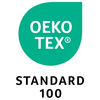
OEKO-TEX® STANDARD 100
Standard Owners (1)
| Name | Country | |
|---|---|---|
| OEKO-TEX(R) | 🇨🇭 Switzerland |
About (OEKO-TEX® STANDARD 100)
The Standard 100 by OEKO-TEX® is a globally recognized certification and testing system for textile products. It is administered by the International Association for Research and Testing in the Field of Textile Ecology, known as OEKO-TEX®. The purpose of the standard is to ensure that textile products are free from harmful substances and safe for human use.
The certification is based on comprehensive testing criteria and requirements. These criteria cover a wide range of substances, including banned or regulated substances, chemicals known to be harmful to health, and substances that are strictly regulated by law. The testing process considers all stages of textile production, from raw materials to the finished product.
To obtain the Standard 100 certification, textile products are tested by independent OEKO-TEX® member institutes. The testing is carried out using standardized methods and evaluates substances such as pesticides, heavy metals, formaldehyde, phthalates, and other harmful chemicals. The products must meet strict limits and guidelines established by OEKO-TEX® to be awarded the certification.
The Standard 100 by OEKO-TEX® certification can be granted to a wide range of textile products, including fabrics, yarns, garments, home textiles, and accessories. It provides reassurance to consumers that certified products have been thoroughly tested for harmful substances and comply with stringent human-ecological requirements.
The certification follows a modular system with four product classes:
Product Class I: This class is for textile products intended for babies and toddlers up to 36 months, including clothing, bedding, and toys.
Product Class II: This class is for textile products in direct contact with the skin, such as underwear, shirts, and socks.
Product Class III: This class includes textile products not in direct contact with the skin, such as outerwear and upholstery materials.
Product Class IV: This class is for textile products with no direct contact with the skin, such as carpets and curtains.
The Standard 100 certification is valid for one year, and regular product testing is required to maintain the certification.
By displaying the Standard 100 by OEKO-TEX® label on their products, manufacturers and brands can demonstrate their commitment to producing textiles that are safe, environmentally friendly, and free from harmful substances. Consumers can rely on the label to make informed choices and select textiles that have met stringent safety standards.
It's important to note that the certification applies to individual products and does not cover the entire manufacturing process or environmental aspects. For broader sustainability considerations, other certifications or standards may be relevant, such as OEKO-TEX® Made in Green or other eco-labels focused on environmental and social responsibility.
For specific details about the Standard 100 by OEKO-TEX® certification, its requirements, and the testing process, it is recommended to consult the official OEKO-TEX® website.